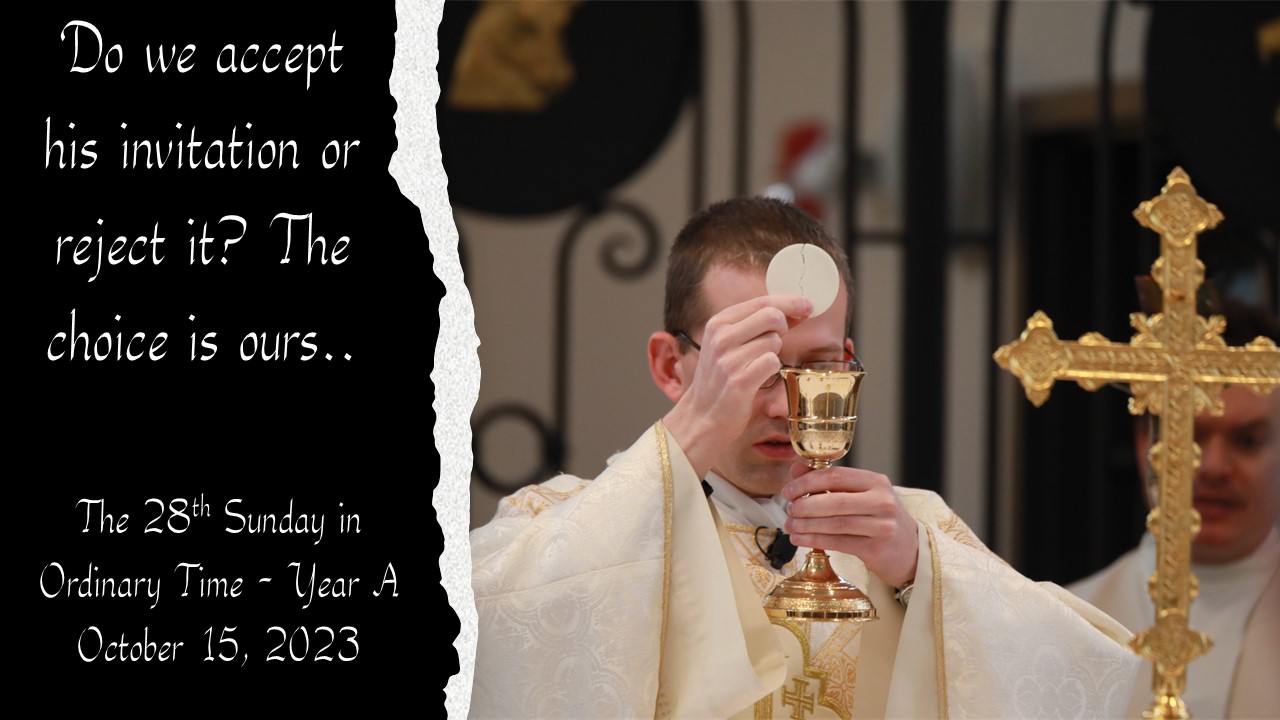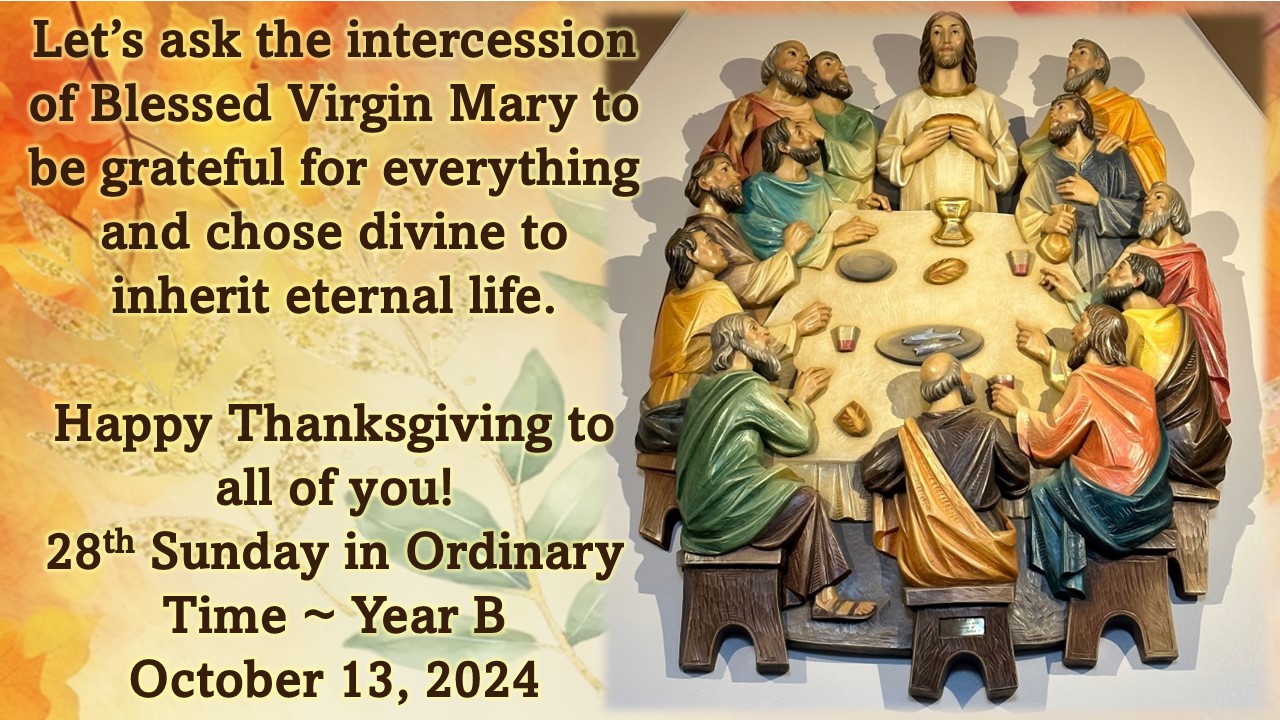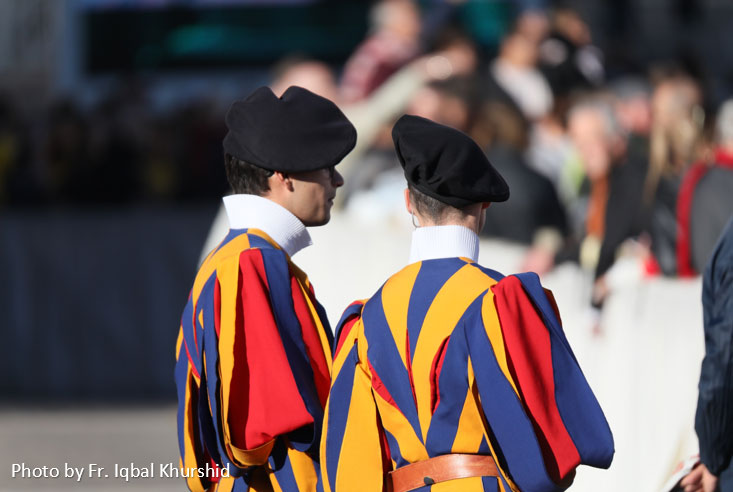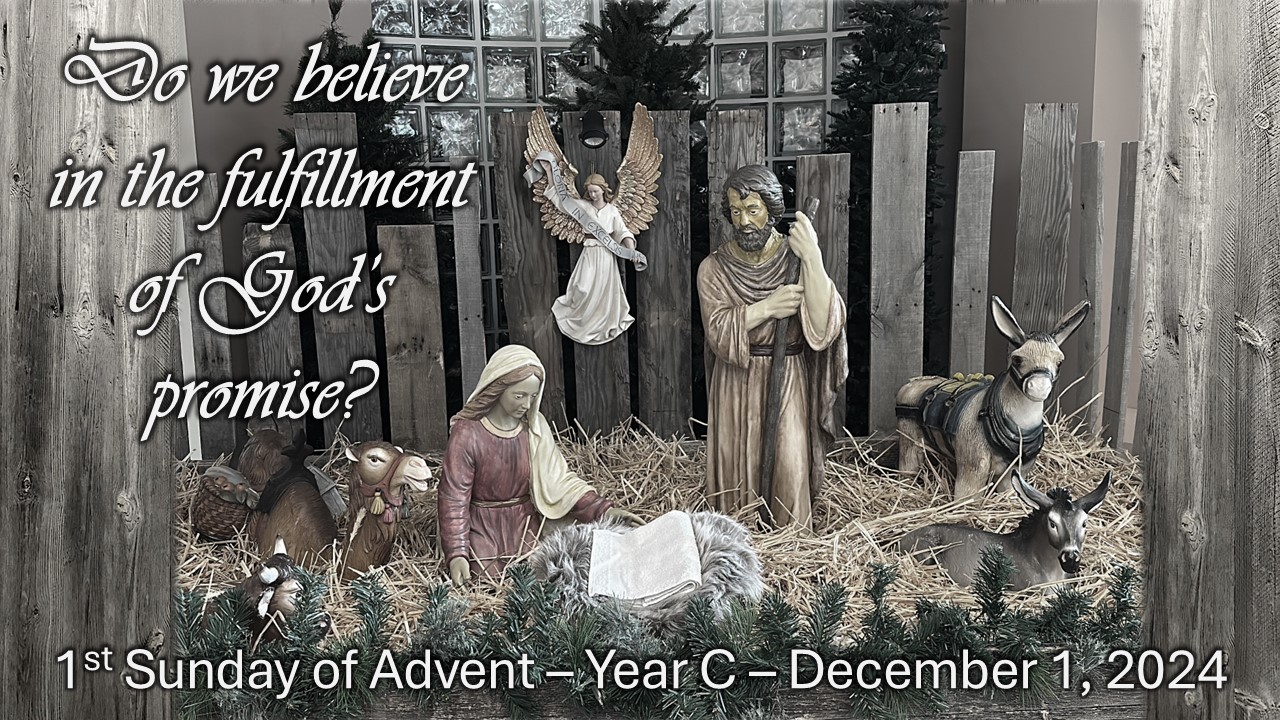
28th Sunday in Ordinary Time – Year A ~ October 15, 2023
BANQUET OF THE LORD AND OUR RESPONSE
A minister passing through his church in the middle of the day decided to pause by the altar and see who had come to pray. Just then the back door opened, a man came down the aisle, the minister frowned as he saw the man hadn’t shaved in a while. His shirt was shabby, old, and his coat was worn and frayed. The man knelt, he bowed his head then rose and walked away. In the days that followed, each noon time came this chap. Each time he knelt just for a moment, a lunch pail in his lap. Well, the minister’s suspicions grew, with robbery a main fear. He decided to stop the man and ask him, “What are you doing here?” The old man said he worked down the road. Lunch was half an hour.
Lunchtime was his prayer time for finding strength and power. “I stay only moments, see, because the factory is so far away. As I kneel here talking to the Lord, this is what I say: I JUST CAME AGAIN TO TELL YOU, LORD, HOW HAPPY I’VE BEEN SINCE WE FOUND EACH OTHER’S FRIENDSHIP, AND YOU TOOK AWAY MY SIN. I DON’T KNOW MUCH OF HOW TO PRAY, BUT I THINK ABOUT YOU EVERYDAY. SO, JESUS, THIS IS JIM, CHECKING IN TODAY.”
The minister, feeling foolish, told Jim, that was fine. He told the man he was welcome to come and pray just anytime. Time to go, Jim smiled, and said “Thanks. “He sped to the door. The minister knelt at the altar; He’d never done it before. His cold heart melted, warmed with love, and met with Jesus there. As the tears flowed, in his heart, He repeated old Jim’s prayer: HOW HAPPY I’VE BEEN, SINCE WE FOUND EACH OTHER’S FRIENDSHIP, AND YOU TOOK AWAY MY SIN. I DON’T KNOW MUCH OF HOW TO PRAY, BUT I THINK ABOUT YOU EVERY DAY.SO, JESUS, THIS IS ME, CHECKING IN TODAY.
“Past noon one day, the minister noticed that old Jim hadn’t come. As more days passed without Jim, He began to worry some. At the factory, he asked about him, learning he was ill. The hospital staff was worried, but he’d given them a thrill. The week that Jim was with them, brought changes in the ward. His smiles, a joy contagious. Changed people, were his reward. The head nurse couldn’t understand why Jim was so glad when no flowers, calls or cards came, not a visitor he had.
The minister stayed by his bed; He voiced the nurse’s concern: No friends came to show they cared. He had nowhere to turn. Looking surprised, old Jim spoke up and with a winsome smile; “The nurse is wrong, she couldn’t know, that in here all the while. Everyday at noon, He’s here, A dear friend of mine, you see, he sits right down, takes my hand, leans over and says to me:
‘I JUST CAME AGAIN TO TELL YOU, JIM, HOW HAPPY I HAVE BEEN, SINCE WE FOUND THIS FRIENDSHIP, AND I TOOK AWAY YOUR SIN. I ALWAYS LOVE TO HEAR YOU PRAY, AND I THINK ABOUT YOU EVERY DAY, SO JIM, THIS IS JESUS, CHECKING IN TODAY.'”
I find the above mentioned story so fitting to the Readings of this weekend as we reflect on the mystery of the banquet. God the Father has prepared a banquet for us with every good thing because he is our Good Shepherd who leads us into the green pastures. Through the banquet Lord is helping us to be grateful and always think about others. St. Ambrose encourages us to be grateful for everything and to remember to “Offer God a sacrifice of praise and fulfill your vows to the Most-High. If you praise God, you offer your vow and fulfill the promise you have made. The Samaritan leper, healed by the Lord’s word of command, gained greater credit than the other nine; he alone returned to Christ, praising God and giving thanks. Jesus said of him: There was no one to come back and thank God except this foreigner. He tells him: Stand up and go on your way, for your faith has made you whole. The Lord Jesus, in his divine wisdom, taught you about the goodness of the Father, who knows how to give good things, so that you might ask for the things that are good from Goodness itself. He urges you to pray earnestly and frequently, not offering long and wearisome prayers, but praying often, and with perseverance. Lengthy prayers are usually filled with empty words, while neglect of prayer results in indifference to prayer.
Again, Christ urges you, when you ask forgiveness for yourself, to be especially generous to others, so that your actions may commend your prayer. The Apostle, too, teaches you how to pray; you must avoid anger and contentiousness, so that your prayer may be serene and wholesome. He tells you also that every place is a place of prayer, though our Savior says: Go into your room. But by “room” you must understand, not a room enclosed by walls that imprison your body, but the room that is within you, the room where you hide your thoughts, where you keep your affections. This room of prayer is always with you, wherever you are, and it is always a secret room, where only God can see you. You are told to pray especially for the people, that is, for the whole body, for all its members, the family of your mother the Church; the badge of membership in this body is love for each other. If you pray only for yourself, you pray for yourself alone. If each one prays for himself, he received less from God’s goodness than the one who prays on behalf of others. But as it is, because each prays for all, all are in fact praying for each one. To conclude, if you pray only for yourself, you will be praying, as we said, for yourself alone. But if you pray for all, all will pray for you, for you are included in all. In this way there is a great recompense; through the prayers of everyone, the intercession of the whole people is gained for everyone. There is no pride, but an increase of humility and a richer harvest from prayer”.
The first reading for the 28th Sunday in Ordinary Time Year A, Isaiah 25:6-10a, paints a vivid picture of God’s benevolence and commitment to His people. The prophet Isaiah speaks of a time when God will prepare a feast for all people, wipe away tears, and remove the disgrace of His people from the earth. This vision is not just about a distant future but serves as a reminder of God’s continuous promise of care and salvation.
Today, many face challenges that make them question their worth or their place in the world. Economic hardships, personal struggles, societal divisions – they all mirror the despair and disgrace felt by Isaiah’s contemporaries. Yet, Isaiah’s words remain relevant, assuring us that even in the midst of adversity, God’s love and provision are steadfast. Applying this message to modern life, it’s a call for hope and resilience. It encourages us to look beyond immediate struggles and recognize the bigger picture of divine promise. Furthermore, in a world where instant gratification is often sought, Isaiah reminds us of the virtue of patience and the value of long-term blessings. Our role is to trust, persevere, and remain faithful, knowing that God’s banquet awaits those who endure.
In the parable from the gospel the significance of the wedding banquet is evident. Jesus uses it as a medium to shed light on our relationship with God. The initial rejection by the invited guests draws parallels with how the Jewish community treated God’s messages and messengers. This neglect to attend the feast speaks volumes about missed opportunities and neglecting divine calls.
The invitation’s extension to everyone, irrespective of their background or deeds, demonstrates God’s inclusive nature. It highlights the idea that salvation and God’s love are available to all. However, there’s an underlying message. Simply showing up isn’t enough. One must also come prepared, spiritually, and mentally to partake in the divine feast. The guest without the wedding attire serves as a cautionary tale. While the invitation is open to all, it’s crucial to be prepared and sincere in our approach. This can be interpreted as the need for genuine faith and commitment to God. Just as attending a wedding requires appropriate attire, embracing God’s love requires genuine devotion and preparedness. The rejection by the initially invited guests in Matthew’s parable can be seen as a mirror to those in Isaiah’s time and even our own, who often overlook or dismiss God’s offerings due to distractions or worldly concerns. The feast in Isaiah represents the promise of salvation and eternal joy, yet many miss out on this divine opportunity. Similarly, in Matthew, the king’s invitation, representing God’s call, is ignored, or treated with disdain, highlighting human tendencies to neglect spiritual wealth for fleeting worldly gains.
Drawing these passages together, it’s evident that God’s benevolent invitation remains constant, spanning across time and testament. The challenge posed to us, both as individuals and as a collective, is to recognize, accept, and prepare for these divine moments. Whether it’s the grandeur of Isaiah’s feast or the solemnity of the wedding banquet in Matthew, both underscore the importance of being spiritually ready and receptive to God’s eternal call.
But the Gospel warns us: the invitation can be rejected. Many of the guests said no, because they were taken over by their own interests: “they did not care and went away, one to his farm, and another to his business”, says the text . One word comes back: “his”; is the key to understanding the reason for rejection. The guests, in fact, did not think that the wedding was sad or boring, but simply “did not care”: they were distracted by “their” interests, they preferred to have something rather than get involved, as love requires. This is how one distances oneself from love, not out of malice, but because one prefers one’s own security, self-affirmation, comforts… Then you lie in the armchairs of profits, pleasures, some hobby that makes you feel a little cheerful, but so you get old early and badly, because you get old inside: when your heart does not expand, it closes, it gets old. And when everything depends on the self – what I want, what I need, what I want – you become rigid and evil, you react in a bad way for nothing, like the guests of the Gospel, who came to insult and even to kill those who brought the invitation, just because they bothered them.
Then the Gospel asks us which side we are on: on the side of oneself or on God’s side? Because God is the opposite of selfishness, of self-reference. He, the Gospel tells us, in the face of the constant rejections he receives, in the face of the refusals of his invitations, he goes on, he does not postpone the feast. He does not resign, but he continues to invite. In the face of the “no’s”, he does not slam the door, but includes even more people. God, in the face of the injustices suffered, responds with a greater love. We, when we are wounded by wrongs and waste, often harbour dissatisfaction and resentment. God, while suffering for our “no’s”, continues to take the initiative again and again, he goes on to prepare good even for those who do evil. Because that’s how love is, it makes love, because that’s the only way evil can be defeated. Today this God, who never loses hope, invites us to act like Him, to live according to true love, to overcome the resignation and whims of our touchy and lazy self.
There is one final aspect that the Gospel emphasizes: the dress of the guests, which is indispensable. It is not enough to answer once the invitation, to say “yes” and that’s it, but you have to put on the cloth, you need the habit of living love every day. Because one cannot say “Lord, Lord” without living and applying God’s will. We need to clothe ourselves every day with his love, to renew God’s choice every day.
There once was a man who had two indentured servants. One day a disagreement arose between them as to who was the greatest in the eyes of their master. So, they went to the master of the house and asked him, “My lord, which of us is greater?”
The master of the house replied, “I will let you discover that for yourself. I will ask each of you a question and you must answer truthfully.” The servants stood before him and he started to question them. To the first servant, he asked, “What do you do for me?”
“Sir, I work in the fields all day long to grow wheat for my lord’s granary,” the first servant replied. “Then, at night, I go through the house and fill all the lamps so that my lord will have light. For this you pay me a wage, but I hope that one day that I may earn my freedom.”
The master nodded his head. He turned to the second indentured servant and asked, “And what do you do for me?”
“Sir,” he replied, “I am an educated man. I am well-versed in literature, music, mathematics and science. I teach your children all that I know so that one day they may leave your house and make a success in the world. And when they do, I hope that you will grant me my freedom. In the meantime, you give me a wage for what I do.” Again, the master nodded. Then he turned to a lowly slave who was standing nearby, and asked, “And what do you do for me?” “You know that I love you, my lord, and my only wish is to do whatever you ask,” the slave answered without hesitation. “You bought me, and I know that I will be a slave for life, therefore I earn no wage. But you are kind and merciful to me, and do not beat me as other masters beat their slaves. You are wise and just and kind and that is why I love you.”
The master of the house smiled. “Then you are the greatest of all my servants and I will make you a free man.”
When they heard this, the two servants were aghast. “Why him?” they cried. “We do much more work than he does. He waits around for you to give him an order, but we labor in your fields without orders, teach your children, and light your lamps. We work unceasingly and should be rewarded.”
“Yes,” the master of the house replied. “You do work in my fields and do all the other things that you said. But this man wants only to serve me, not himself. He waits patiently until I tell him what I want him to do. His faithfulness has never failed him. He now has his reward — his freedom. And I will place him as overseer, and you will be his servants. Because of his faithful service to me — though he was once a lowly slave — he is truly the greater.”
Holy Eucharist is God’s biggest banquet for us, enjoy his sacrifice at the Holy Altar. How do we attend this banquet? Do we accept his invitation or reject it? The choice is ours.
Other Sermons In This Series

28TH SUNDAY IN ORDINARY TIME YEAR B ~ OCTOBER 13, 2024
October 10, 2024

Be On Guard | November 28, 2021
November 28, 2021

1ST SUNDAY OF ADVENT YEAR C ~ DECEMBER 1, 2024
November 28, 2024

